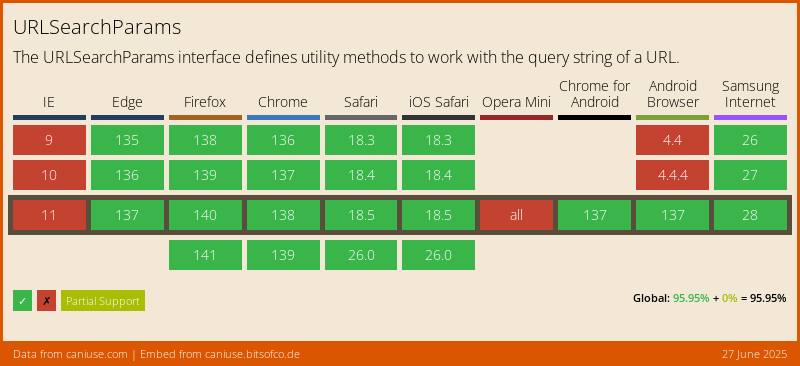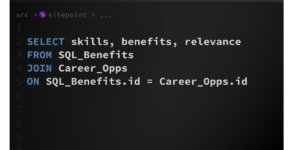URL parameters (also called query string parameters or URL variables) are used to send small amounts of data from page to page, or from client to server via a URL. They can contain all kinds of useful information, such as search queries, link referrals, product information, user preferences, and more.
In this article, we’ll show you how to parse and manipulate URL parameters using JavaScript.
Getting a URL Parameter
In modern browsers, this has become a lot easier, thanks to the URLSearchParams interface. This defines a host of utility methods to work with the query string of a URL.
Assuming that our URL is https://example.com/?product=shirt&color=blue&newuser&size=m, we can grab the query string using window.location.search:
const queryString = window.location.search;
console.log(queryString);
// ?product=shirt&color=blue&newuser&size=m
We can then parse the query string’s parameters using URLSearchParams:
const urlParams = new URLSearchParams(queryString);
Then we call any of its methods on the result.
For example, URLSearchParams.get() will return the first value associated with the given search parameter:
const product = urlParams.get('product')
console.log(product);
// shirt
const color = urlParams.get('color')
console.log(color);
// blue
const newUser = urlParams.get('newuser')
console.log(newUser);
// empty string
Other Useful Methods
Checking for the Presence of a Parameter
You can use URLSearchParams.has() to check whether a certain parameter exists:
console.log(urlParams.has('product'));
// true
console.log(urlParams.has('paymentmethod'));
// false
Getting All of a Parameter’s Values
You can use URLSearchParams.getAll() to return all of the values associated with a particular parameter:
console.log(urlParams.getAll('size'));
// [ 'm' ]
//Programmatically add a second size parameter.
urlParams.append('size', 'xl');
console.log(urlParams.getAll('size'));
// [ 'm', 'xl' ]
Iterating over Parameters
URLSearchParams also provides some familiar Object iterator methods, allowing you iterate over its keys, values and entries:
const
keys = urlParams.keys(),
values = urlParams.values(),
entries = urlParams.entries();
for (const key of keys) console.log(key);
// product, color, newuser, size
for (const value of values) console.log(value);
// shirt, blue, , m
for(const entry of entries) {
console.log(`${entry[0]}: ${entry[1]}`);
}
// product: shirt
// color: blue
// newuser:
// size: m
Browser Support
Browser support for URLSearchParams is good. At the time of writing, it’s supported in all major browsers.
There’s a polyfill available if you have to support legacy browsers such as Internet Explorer. Or, you could follow along with the rest of this tutorial and learn how to roll your own.
Rolling Your Own Query String Parsing Function
Let’s stay with the URL we were using in the previous section:
http://example.com/?product=shirt&color=blue&newuser&size=m
Here’s a function to give you all the URL parameters as a neat object:
function getAllUrlParams(url) {
// get query string from url (optional) or window
var queryString = url ? url.split('?')[1] : window.location.search.slice(1);
// we'll store the parameters here
var obj = {};
// if query string exists
if (queryString) {
// stuff after # is not part of query string, so get rid of it
queryString = queryString.split('#')[0];
// split our query string into its component parts
var arr = queryString.split('&');
for (var i = 0; i < arr.length; i++) {
// separate the keys and the values
var a = arr[i].split('=');
// set parameter name and value (use 'true' if empty)
var paramName = a[0];
var paramValue = typeof (a[1]) === 'undefined' ? true : a[1];
// (optional) keep case consistent
paramName = paramName.toLowerCase();
if (typeof paramValue === 'string') paramValue = paramValue.toLowerCase();
// if the paramName ends with square brackets, e.g. colors[] or colors[2]
if (paramName.match(/\[(\d+)?\]$/)) {
// create key if it doesn't exist
var key = paramName.replace(/\[(\d+)?\]/, '');
if (!obj[key]) obj[key] = [];
// if it's an indexed array e.g. colors[2]
if (paramName.match(/\[\d+\]$/)) {
// get the index value and add the entry at the appropriate position
var index = /\[(\d+)\]/.exec(paramName)[1];
obj[key][index] = paramValue;
} else {
// otherwise add the value to the end of the array
obj[key].push(paramValue);
}
} else {
// we're dealing with a string
if (!obj[paramName]) {
// if it doesn't exist, create property
obj[paramName] = paramValue;
} else if (obj[paramName] && typeof obj[paramName] === 'string'){
// if property does exist and it's a string, convert it to an array
obj[paramName] = [obj[paramName]];
obj[paramName].push(paramValue);
} else {
// otherwise add the property
obj[paramName].push(paramValue);
}
}
}
}
return obj;
}
You’ll see how this works soon, but first, here are some usage examples:
getAllUrlParams().product; // 'shirt'
getAllUrlParams().color; // 'blue'
getAllUrlParams().newuser; // true
getAllUrlParams().nonexistent; // undefined
getAllUrlParams('http://test.com/?a=abc').a; // 'abc'
And here’s a demo for you to play around with.
See the Pen rQGWpP by SitePoint (@SitePoint) on CodePen.
Things to Know Before Using This Function
-
Our function assumes the parameters are separated by the
&character, as indicated in the W3C specifications. However, the URL parameter format in general is not clearly defined, so you occasionally might see;or&as separators. -
Our function still works if a parameter doesn’t have an equals sign or if it has an equals sign but no value.
-
The values of duplicate parameters get put into an array.
If you just wanted a function you could drop into your code, you’re done now. If you’d like to understand how the function works, read on.
The following section assumes you know some JavaScript, including functions, objects, and arrays. If you need a refresher, check out the MDN JavaScript reference.
How the Function Works
Overall, the function takes a URL’s query string (the part after the ? and before the #) and spits out the data in a neat object.
First, this line says, if we’ve specified a URL, get everything after the question mark, but otherwise, just use the URL of the window:
var queryString = url ? url.split('?')[1] : window.location.search.slice(1);
Next, we’ll create an object to store our parameters:
var obj = {};
If the query string exists, we’ll start parsing it. First we have to make sure to shave off the part starting from the #, since it’s not part of the query string:
queryString = queryString.split('#')[0];
Now we can split the query string into its component parts:
var arr = queryString.split('&');
That will give us an array that looks like this:
['product=shirt', 'color=blue', 'newuser', 'size=m']
Next, we’ll loop through this array and split each item into a key and a value, which we’ll soon put into our object:
var a = arr[i].split('=');
Let’s assign the key and a value to individual variables. If there isn’t a parameter value, we’ll set it to true to indicate that the parameter name exists. Feel free to change this depending on your use case:
var paramName = a[0];
var paramValue = typeof (a[1]) === 'undefined' ? true : a[1];
Optionally, you can set all parameter names and values to lowercase. That way, you can avoid situations where someone sends traffic to a URL with example=TRUE instead of example=true and your script breaks. (I’ve seen this happen.) However, if your query string needs to be case sensitive, feel free to omit this part:
paramName = paramName.toLowerCase();
if (typeof paramValue === 'string') paramValue = paramValue.toLowerCase();
Next, we need to deal with the various types of input we can receive in paramName. This could be an indexed array, a non-indexed array, or a regular string.
If it’s an indexed array, we want the corresponding paramValue to be an array, with the value inserted at the correct position. If it’s a non-indexed array, we want the corresponding paramValue to be an array with the element pushed on to it. If it’s a string, we want to create a regular property on the object and assign the paramValue to it, unless the property already exists, in which case we want to convert the existing paramValue to an array and push the incoming paramValue on to that.
To illustrate this, here’s some sample input, with the output we would expect:
getAllUrlParams('http://example.com/?colors[0]=red&colors[2]=green&colors[6]=blue');
// { "colors": [ "red", null, "green", null, null, null, "blue" ] }
getAllUrlParams('http://example.com/?colors[]=red&colors[]=green&colors[]=blue');
// { "colors": [ "red", "green", "blue" ] }
getAllUrlParams('http://example.com/?colors=red&colors=green&colors=blue');
// { "colors": [ "red", "green", "blue" ] }
getAllUrlParams('http://example.com/?product=shirt&color=blue&newuser&size=m');
// { "product": "shirt", "color": "blue", "newuser": true, "size": "m" }
And here’s the code to implement the functionality:
if (paramName.match(/\[(\d+)?\]$/)) {
var key = paramName.replace(/\[(\d+)?\]/, '');
if (!obj[key]) obj[key] = [];
if (paramName.match(/\[\d+\]$/)) {
var index = /\[(\d+)\]/.exec(paramName)[1];
obj[key][index] = paramValue;
} else {
obj[key].push(paramValue);
}
} else {
if (!obj[paramName]) {
obj[paramName] = paramValue;
} else if (obj[paramName] && typeof obj[paramName] === 'string'){
obj[paramName] = [obj[paramName]];
obj[paramName].push(paramValue);
} else {
obj[paramName].push(paramValue);
}
}
Finally, we return our object with the parameters and values.
If your URL has any encoded special characters like spaces (encoded as %20), you can also decode them to get the original value like this:
// assume a url parameter of test=a%20space
var original = getAllUrlParams().test; // 'a%20space'
var decoded = decodeURIComponent(original); // 'a space'
Just be careful not to decode something that’s already decoded or else your script will error out, especially if percents are involved.
Anyways, congrats! Now you know how to get a URL parameter, and hopefully have picked up some other tricks along the way.
Conclusion
The code in this article works for the most common use cases where you would get a URL query parameter. If you’re working with any edge cases, such as uncommon separators or special formatting, then be sure to test and adjust accordingly.
If you want to do more with URLs, there are specific libraries available, such as query-string and Medialize URI.js. But since it’s basically string manipulation, it often makes sense just to use plain JavaScript. Whether you use your own code or go with a library, be sure to check everything and make sure it works for your use cases.
If you enjoy playing with strings, check out our posts on splitting strings into substrings, converting strings to numbers, and converting numbers to strings and ordinals. For more in-depth JavaScript knowledge, read our book JavaScript: Novice to Ninja, 2nd Edition.
FAQs: Getting URL Parameters with JavaScript
URL parameters, also known as query parameters or query strings, are key-value pairs appended to the end of a URL. They are separated by “&” and typically used to pass data between a web page and the server.
You can access URL parameters using the window.location.search property to retrieve the entire query string, and then parse it using methods like URLSearchParams or custom JavaScript functions to extract specific parameters.
window.location.search in JavaScript? window.location.search is a property in the browser’s JavaScript environment that returns the query string portion of the URL. It includes everything following the “?” in the URL.
URLSearchParams? The URLSearchParams API provides methods to extract and manipulate URL parameters. You can create a new instance of URLSearchParams with the query string, and then use methods like get() to retrieve specific parameter values.
URLSearchParams? Yes, you can manually parse the query string using JavaScript functions like split() and forEach(). However, using URLSearchParams is a more convenient and standardized approach.
 Yaphi Berhanu
Yaphi BerhanuYaphi Berhanu is a web developer who loves helping people boost their coding skills. He writes tips and tricks at http://simplestepscode.com. In his completely unbiased opinion, he suggests checking it out.
 James Hibbard
James HibbardNetwork admin, freelance web developer and editor at SitePoint.






